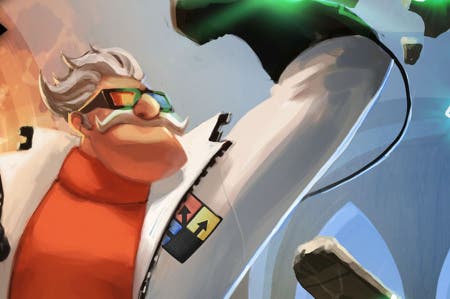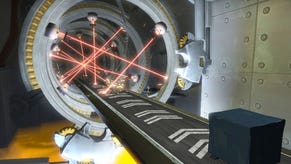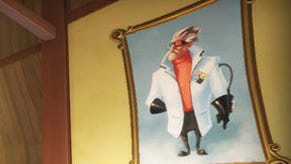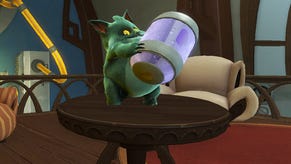Quantum Conundrum Review
We weren't even testing for that.
The grand joke of the Portal games is that they take place in a series of scientific test chambers, the player a lab rat running through a devious maze designed by a sadistic higher intelligence. A mad computer or a bunch of game designers - what's the difference?
It's an echo of the way Valve makes games, obsessively focus-testing, studying biometric data and video of players' faces until the flow of a level is perfect, the difficulty of a puzzle is pitched just so, the gags land at precisely the right moment. Just as the player is a slave to the designers, the designers are slaves to the almighty test. That's how the company took a raw student project called Narbacular Drop - a game with a counter-intuitive concept in the uncomfortable and rarely used first-person puzzle genre - and turned it into two flawless, frictionless Portal adventures.
Kim Swift, one of the student creators of Narbacular Drop, went on to make the first Portal at Valve before leaving to join Airtight Games and direct Quantum Conundrum. It's a game made in Portal's image: a sequence of puzzle chambers played from a first-person perspective in which the player must distort the laws of physics to progress, wrapped up in some jokey narration with a science-gone-wrong theme.
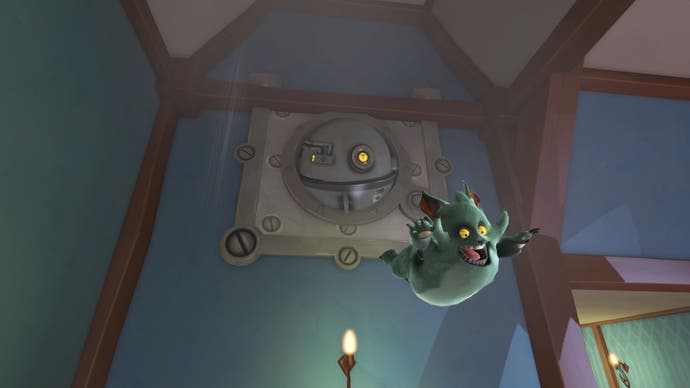
But the absence of that testing mantra is sorely felt, both within and without its fiction. I don't mean testing in the bug-hunting and logic-fixing sense, as Quantum Conundrum is well put together and plays smoothly. But without the testing conceit, its tissue-thin narrative falls apart, weak jokes doing nothing to paper over the wide cracks between its abstract challenges and forced setting. And without Valve's rigorous playtesting, the game falls prey to the classic designer's curse - tunnel vision. Quantum Conundrum's creators can only see the ingenuity of their ideas, and not the layer of mechanical frustration between them and the player.
Those ideas are pretty clever, to be fair, although the set dressing doesn't convince. It's an anodyne version of a Dexter's Laboratory-style cartoon in which your character, a young boy, is dropped off on the doorstep of his uncle's mansion. The uncle, Professor Fitz Quadwrangle, is a mad scientist and only present as a disembodied voice reporting from an alternate dimension where he appears to have lost himself. It's up to you to exploit his invention, the Interdimensional Shift Device - a glove that allows you to switch instantaneously between dimensions of reality - to solve the riddles that litter his house and find him.
You can flip to the Fluffy dimension, where everything is pastel-coloured and light as a pillow, or the Heavy dimension where the same objects are wrought of rusted iron and ten times their normal weight. As you progress, you gain access to a dimension that slows time to a crawl (and takes you back to the '70s, judging by the blurry, scratchy film overlay) and another that reverses gravity so that loose objects fly to the ceiling.
The dimensions have no effect on your person or the fabric of the house, so the game is mostly a matter of manipulating the objects that are left lying around or vomited up by the convenient switch-operated replicators. Turn a cardboard box to iron so it's heavy enough to trigger a switch plate, say, or turn a safe fluffy to pick it up and throw it, before flicking back to the real world so it crashes heavily through a glass plane.
"Too often, the satisfaction of figuring out the solution to one of Quantum Conundrum's fine puzzles is soured by the frustration of trying and failing, again and again, to enact your solution."
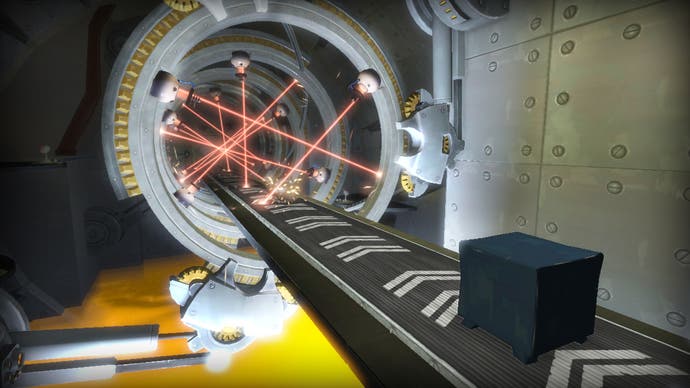
Giant fans, lasers and other contraptions come into play, and sometimes batteries need to be slotted into sockets to power the four dimensions. The way your access to the dimensions is controlled feels arbitrary - but most everything in Quantum Conundrum exists only to serve the next puzzle, and that's fair enough.
There's plenty of room for ingenuity and entertainment in the interplay between the dimensions, and Airtight Games exploits most of this room with some cunningly designed chambers. It's a more fluid game than Portal with a more experimental play style, stringing together sequences of riddles and challenges rather than constructing those monolithic systems of cause-and-effect that fall into place with one resounding revelation - but at its best, it's still a satisfying mental workout. That best arrives with the introduction of the brilliant slow dimension, after a regrettably dull first act in which you're limited to changing the weight of objects.
Quantum Conundrum isn't just a mental test, though. Finding the solution is less than half the challenge of its tougher chambers; the rest is brutal reaction-test gaming requiring lightning-fast dimension shifts, precise catches and throws, perfectly timed and positioned jumps, or all three at once as you hop between flying objects and change their properties in mid-air. In action, it is that most unloved of things, a first-person platformer. And it's a hard and fast one, with slippery controls that lack the predictability and sense of weight of, say, the Metroid Prime games.
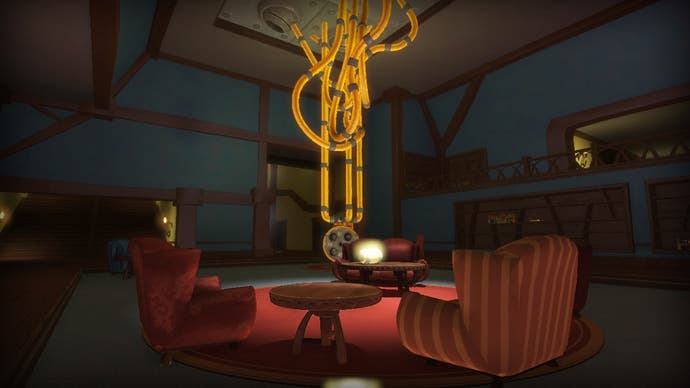
It's a critical mistake. If a puzzle-platformer wants to test skill, its systems need to be ruthlessly simple, like the three-button layout of VVVVVV; Quantum Conundrum, with four independently-triggered dimensions as well as jump, catch and throw controls, is complex. If it wants to explore spatial ideas, it should let them speak for themselves as Fez or Portal does, rather than muddy them with too many opportunities for failure. Arguably, the game's focus on object manipulation and platforming would have been better served by a third-person perspective.
Too often, the satisfaction of figuring out the solution to one of Quantum Conundrum's fine puzzles is soured by the frustration of trying and failing, again and again, to enact your solution. By the time you get to the next room, you've no intellectual pride left, only bitter relief. The Eureka moment - the defining pleasure of puzzle gaming - is almost lost down the gap between idea and execution, between a good puzzle game and a flawed game of skill.
Those moments are still there, just, echoing faintly around the game's threadbare faux-Nickelodeon styling. The artwork is fine but a mere handful of tiles and objects have been stretched too thin around cavernous, repeating environments, giving this cartoon mansion a dreary, bland atmosphere. The Professor's half-hearted quips, filling time between chambers, barely raise a smile. Airtight doesn't have the wit or resources to pull off this alternative take on the Portal formula.
Quantum Conundrum is a budget game, and Swift and her team can't be expected to match the perfect cohesion of Portal. The disappointment is that, in trying to do just that, they've undersold their own good ideas as well as inviting unflattering comparisons with a classic. Despite its frequent frustrations, it's a solid, intelligent puzzle adventure and represents good value for money, but it could have been much more by trying to be a bit less. As it is, Swift has consigned herself to her own creation's shadow.
